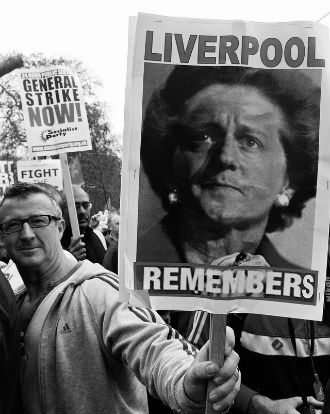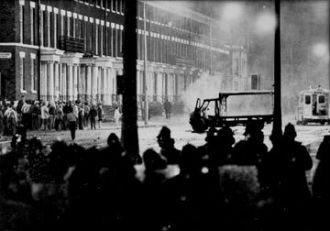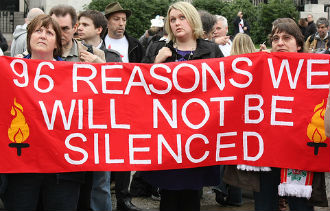
There are going to be parties in Liverpool tonight. Hot on the heels of Paddy’s Day and the Grand National Weekend there’s another reason for Liverpool to do what it does best - throw a party. The reason? An old lady died earlier today.
Not, you might think, grounds for a celebration really. In fact, in bald terms, it’s all a bit sad really. But while I don’t revel in the death of Margaret Thatcher I can certainly understand why people feel that way. I was brought up in Hartlepool - a town that had it tough in the 80s and has arguably never recovered from the decimation of coal-mining, dock-working, steel-working, petrochemical and shipbuilding industries - and like many in Liverpool I learned that the Conservative Party under Thatcher was, unequivocally, the enemy. With steel on one side of the family and coal on the other it couldn’t have been any other way.
Hartlepool and Liverpool - the two places I’ve always called home - have always struck me as similar in many ways and they were both at the sharp end of Thatcherism. Liverpool seems to be about to engage in another war of attrition with central government over spending cuts, as it did in the 80s. Thatcher may not be gone but her ideology of cutting government spending and slashing the state now seems to be mutely, glumly accepted by the country.

There’s a strange equanimity nowadays towards this form of class war, which has found its latest outlet in attacking families living on welfare - the feckless and despised poor. Because it was a war - a war whose aim was the humbling of the unions and wrestling down of inflation. Happily both were achieved as a consequence of destroying our industrial base and flogging what remained overseas; the predictable results on the Mersey, Clyde, Tyne, Wear and Tees were a decade rampant unemployment and social unrest.
It’s only arguably in recent years that Liverpool has recovered from the twin assaults of 70s stagflation and the next decade’s Thatcherism; just in time for another Conservative Government to come along and start lecturing us about getting on our bikes.
Still, the idea pervades that we needed to take our medicine in the 80s, just as the nonsense of austerity continues to enjoy political capital - as we sell off bits of Sefton Park, prepare to close half our libraries and turn away kids from nurseries and Surestart centres. The Conservatives might as well write off Liverpool as far as elections go for a generation - Merseyside’s Conservatives only prosper on The Wirral nowadays and Liverpool has now Conservative councillors at all - but it wasn’t always like this.
Post-war Liverpool had been a city that returned four Conservative MPs to Parliament, and that odd axis of Liverpool Tories was represented by the likes of Jimmy Tarbuck, Ken Dodd, Kenny Everett, Cilla Black and Freddie Starr in the 80s. The working-class Tory was not a new phenomenon and it might have continued in Liverpool well into the 80s were it not for two lightning rods in the city under Thatcher: Hillsborough and Toxteth taught Liverpool that it was the enemy as far as the Conservative government was concerned - perhaps as far as the rest of the country, or the south at least, were concerned.

Thatcher’s role in both still seems hard to pin down. We know that she was urged to let Liverpool slide into a “managed decline”, possibly to allow Liverpool to become a “museum of horrifying example” - a warning to the rest of the North not to defy the Government. However, Thatcher despatched Michael Heseltine, perhaps Liverpool’s greatest friend outside of the city, to kickstart a slow regeneration instead.
It seems possible that more details might emerge about Thatcher’s role in the Hillsborough cover-up now; while we know about the terrible behaviour of some Tory MPs and functionaries, exactly what she knew and advocated is still nebulous. Regardless, the then Prime Minister is now aligned in the minds of many with the fallout from 15 April 1989.
Looking back at Liverpool in the 80s it’s not hard to see from where the antipathy comes, when I look at the messages from friends and colleagues on Facebook. Thatcher is a figurehead for all the ills of the Tory party; everything that people found - and continue to find - despicable, self-serving, vicious and callous about Conservatives; the self-confessed nasty party.

When I was young I was told a story about my great-grandfather going down the pit to work for the weekend, with only a raw onion for sustenance - one of the casual cruelties of an era when people were condemned to miserable, back-breaking lives by a consequence of where and when they happened to be born. With the passage of time and the broadening of horizons I’m now friends with people who are avowedly, actively right-wing but, as a reminder of where I came from and the reason behind my inherited attitudes to class and politics, that story is seared onto the brain.
Liverpool has its own documents that serve as a reminder. The Hillsborough Independent Panel report and The Scarman Report are two pillars that describe what went wrong in Liverpool in the 80s, albeit with debatable connections to Thatcher herself. But there is another that describes the hopelessness and desperation in Liverpool that is strongly aligned with Britain’s first female Prime Minister.
Boys From The Blackstuff, with its blasted landscapes, dole office queues, derelict docks and proud families humbled by poverty, encapsulates what happens when a country turns its fire on its own people and makes an enemy, an example, of a city. It is Liverpool’s very own reminder of what Thatcherism meant here and why the responses of people born and bred in Liverpool don’t surprise me.
We live in an age where equivocation and consensus are damned with scorn. The appearance of decisiveness is lauded above all; rigid bloody-mindedness is equated with strength of character and cruelty repackaged as strength of conviction. Margaret Thatcher should give lie to those notions. Many politicians, in carefully worded statements, have today conceded that Thatcher was a “divisive” character. A small word - divide - but one that spelled disaster for many in the 80s; people in Scotland, Wales, Liverpool and Hartlepool, cast aside for a political experiment, finding themselves on the wrong side of that dividing line.
30 years on we find ourselves unable to build our way out of a recession because we don’t have a remaining industrial base or the associated skills - all swapped for call centres and minimum-wage service-sector jobs - and the North is again to be sacrificed an the altar of ideology. Joe Anderson says that the effect in Liverpool of the coming cuts will be four times the national average. History repeats itself.
Liverpool may have seen off Margaret Thatcher, but the effects of her tenure as Prime Minister will continue to felt across Merseyside, long beyond tonight’s parties and tomorrow’s sore heads.
Top and bottom pictures by cliffjamester and Feggy Art, via Flick, respectively

© 2010 - 2013 Sevenstreets.com | All rights reserved
















Pingback: 7 of the best anti-Thatcher songs | Sevenstreets
Pingback: Thatcher? Tramp the dirt down. | That's How The Light Gets In